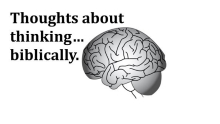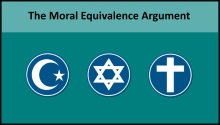
President Elect Donald Trump has selected six professed Christians to play a role in his inauguration. This is part two in our three-part series where we tell you what we know about them.

Yesterday we determined that because our actions flow from our beliefs, and beliefs are formed by thoughts, that thinking-biblically was of the highest priority. This does not diminish the importance of behaving biblically, however. It is through our actions that we prove what we believe. Jesus said, “You will recognize them by their fruit” (Matthew 7.16). In context, Jesus is telling the disciples how to recognize dangerous people who try to influence the people of God. The point being made is that we need to do more than listen to what people profess, we need to pay attention to what they do.

We spend a lot of time on this site talking about connecting with the God who can be known, but a sermon last Sunday reminded me that those connections can be broken. He demonstrated this truth by plugging in a lamp, which shone brightly, and unplugging it causing it to go dark. In modern language, we say that we have become distant from God. In first century parlance, we have stopped “remaining in God.” Have a look at John 15.5, “I am the vine; you are the branches. The one who remains in me—and I in him—bears much fruit…

Yesterday we looked at how to create righteous goals for the new year by asking three key questions: How do my actions impact my relationship with God, how do my actions impact my spiritual growth, and how do my actions impact my ability to share the gospel? Through careful observation of our lives and by being honest with ourselves we can determine proper goals. But this is only part of what we need to know to develop the kinds of goals that honor God and build our connection to him. Today we examine four areas in which we ought to determine goals.

President Elect Donald Trump has selected six professed Christians to play a role in his inauguration. In this three-part series, we’ll tell you what we know about them.

What do we mean by “think biblically”? Or perhaps a better place to begin is, what is it we are reading when we attempt to read the Bible? No doubt most will answer, as we’ve been trained, with “words”. A Christian may even answer, “God’s words”. Neither answer is correct. Word’s on a page communicate nothing unless they adhere to rules of language, and even then the purpose may be obscured. No, what we read when we come to any literature are thoughts. In the case of the Bible, we are reading God’s thoughts. To “think biblically” then is to “think God’s thoughts”.

The Ayatollah Khomeini once said, “We know of no absolute values besides total submission of the will to the Almighty.” That sounds good on the surface and might even be something a Christian might use to find common ground with a Muslim friend. That is, until you uncover what Islam teaches about the character and will of the “Almighty”. We’ve discussed before the differences between the Muslim God Allah and a the Jewish\Christian God YHWH before, but in light of recent events I thought it useful to stress those difference once more especially since the media doesn’t seem to get it.

Just like a ship, there are times when a person’s life needs a course correction. For the last 33 years, on December 27, I take time out to evaluate the past year and make goals for the new. This is not a New Year’s resolution, my goals are not tethered to the physical (there are no weight loss or work out goals here, or vows to stop a bad habit), but rather to my connection with God. By examining the failures of the past year, I can make better choices in the year ahead. I’m sure many of you have such a ritual as well. How can we make it better?

When I was in high school I attended a Christian conference here in Denver. I don’t remember exactly how many students attended but the number was in the thousands. The news media showed up and we thought that finally a positive, Christian event was going to get the press it deserved. That night, watching the evening news, I was sorely disappointed. The news anchor didn’t even mention it was a Christian conference, only how many pizzas it took to feed all the attendees. I learned then to never trust the mainstream media.

Yesterday we concluded that “fear” is behind many of our failures of faith. We mentioned some personal fears, like losing one’s job, and larger fears like government intrusion, and these are only the tip of the iceberg. How are we expected to praise the name of Jesus before a world suffering racial violence, coping with terrorist attacks and increasing confusion over sexuality and gender? The Bible does provide relevant direction for all the issues we face, yet it seems the world is less and less interested. How do we make them curious about all God and his word have to offer?

Three days until the beginning of 2017 I want to offer one final thought regarding New Year’s resolutions. What we have looked at so far, identifying areas needed for improvement and how to make righteous goals, can seem like a lot of work – and it is. Being honest with ourselves and identifying areas of weakness usually is. Even so, I offer this encouragement: becoming more like Jesus often doesn’t require hard labor but an open heart. Remember Jesus’ words: “For my yoke is easy to bear, and my load is not hard to carry” (Matthew 11.30).

Today is Christmas, the day we celebrate the birth of our savior Jesus, but how is it that December 25th came to be celebrated for this historic occasion? Many modern scholars believe that the Roman Catholic Church chose this date in an effort to “Christianize” pagan winter festivals, but this is likely not the case. There may in fact be real evidence for December 25th being the actual date of Jesus’ birth. I’d like to say this evidence is new, but it is really quite ancient, which makes it an even more compelling argument. Interested? Read on!

